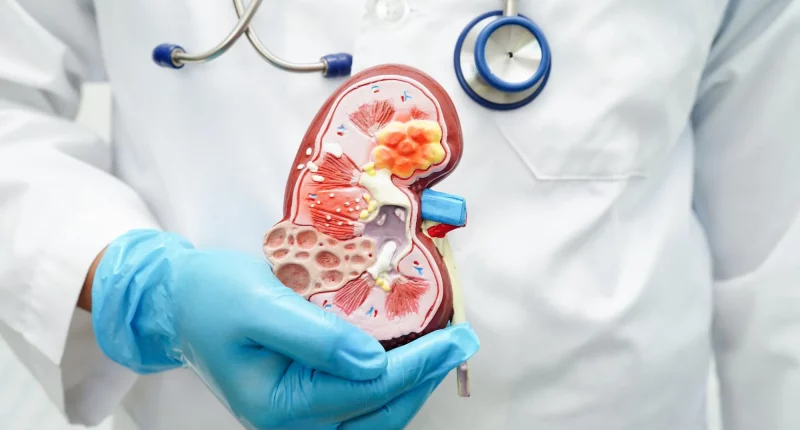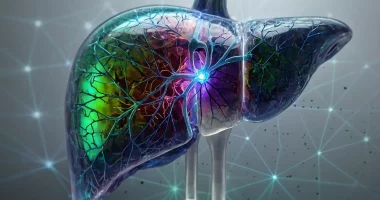Nephritis is a disease where the tiny filtering units in the kidneys, known as nephrons, get inflamed. Another name for nephritis is glomerulonephritis. This inflammation can interfere with how well the kidneys work, causing changes in urination habits and urine, and sometimes leading to swelling in the feet, hands, and other areas of the body.
The kidneys are shaped like beans and their job is to filter the blood. They remove extra water and waste products, keeping the body’s balance of fluids and minerals in check.
There are many different kinds of nephritis, each with its own causes. Some types of nephritis start suddenly, while others develop slowly over time as part of a long-term condition. Managing nephritis often involves ongoing treatment to keep it under control.
Types
Nephritis comes in various types, each with distinct causes and symptoms.
Acute glomerulonephritis
Acute glomerulonephritis can grow suddenly following severe infections like hepatitis, strep throat, or HIV. Conditions like vasculitides, lupus, and granulomatosis with polyangiitis can also trigger acute kidney inflammation, requiring instant medical treatment during flare-ups to stop kidney damage.
Lupus nephritis
Lupus nephritis is a complication of lupus, an autoimmune disease where the immune system mistakenly triggers healthy tissues, including the kidneys. Over half of people diagnosed with lupus eventually grow lupus nephritis, characterized by symptoms such as foamy urine, hypertension, and swelling in the ankles, legs, and feet. Prompt medical attention is crucial to manage symptoms and prevent further kidney damage, as lupus nephritis can vary in severity and sometimes requires ongoing treatment.
Alport syndrome
Alport syndrome, also known as hereditary nephritis, is inherited and can cause kidney failure, along with hearing and vision problems. It tends to be more severe in men due to genetic factors.
Chronic glomerulonephritis
Chronic glomerulonephritis progresses slowly and may show few signs in its starting stages. It can cause serious kidney damage and eventual kidney failure, sometimes running in families or developing after an acute illness.
IgA nephropathy
IgA nephropathy, a common kind of nephritis, occurs when IgA antibody deposits accumulate in the kidneys, causing inflammation. It’s often unnoticed in young people due to mild early symptoms but can be managed with medications to control blood pressure.
Interstitial nephritis
Interstitial nephritis develops rapidly and is usually triggered by infections or certain medications. It affects the interstitium, a fluid-filled space in the kidney. Promptly removing the problematic medication can sometimes lead to a full recovery within weeks, but if left untreated, it can progress to kidney failure over time.
Causes
Nephritis can have many different causes, and sometimes the exact reason isn’t clear. It often appears in heredity, hinting at a possible genetic link. Certain infections like HIV, hepatitis B, or hepatitis C can also trigger nephritis.
Sometimes, nephritis can be caused by medications. For example, some antibiotics or pain relievers can damage the kidneys and cause nephritis. Consuming too many nonsteroidal anti-inflammatory drugs can also contribute to developing this condition. It’s important to use medications responsibly and follow medical advice to avoid complications like nephritis.
Risk factors
Several factors increase the risk of developing kidney disease. A significant risk factor is having family genetics of kidney disease, which suggests a genetic predisposition to the condition. Hypertension is another crucial risk factor. When blood pressure remains consistently high, it can strain the kidneys over time, leading to kidney damage. Similarly, diabetes is a major risk factor as it can cause damage to the kidneys’ delicate filtering units. Obesity and heart disease also contribute to kidney disease risk. Obesity puts extra pressure on the kidneys, while heart disease can affect blood flow to these organs, impacting their function. Lastly, individuals aged 60 years or older are at increased risk due to the natural aging process, which can weaken kidney function over time. Understanding these risk factors is essential for early detection and management of kidney disease.
Symptoms
Nephritis often starts with mild symptoms that may not seem alarming at first. However, these early signs can be important indicators of the condition. One common symptom is changes in urination, such as needing to urinate more or less frequently than usual, or experiencing pain or difficulty while urinating. Another key sign is swelling, particularly noticeable in areas like the hands, ankles, feet, and face. This swelling occurs because the kidneys are not effectively filtering excess fluid from the body.
Changes in urine color and texture are also telltale signs of nephritis. The urine may appear darker than usual, or it may be foamy in texture, which can indicate protein leakage. Additionally, some individuals may notice blood in their urine, which is a concerning symptom that should prompt immediate medical attention. Recognizing these symptoms early can help in diagnosing nephritis and starting appropriate treatment to prevent further kidney damage.
When to consult a healthcare provider
If your urine appears brown or pink due to blood, it’s important to see a doctor right away. This could indicate a serious issue that needs medical attention.
It’s also a good idea to seek medical help if you notice any other changes in your urine, such as unusual color or foamy texture. Early medications can help prevent long-term damage to your kidneys and avoid more serious problems caused by nephritis. Seeing a doctor promptly allows for timely diagnosis and management of any kidney-related issues you may be experiencing.
Diagnosis
Diagnosing nephritis can sometimes happen during routine medical tests, like urine or blood tests. If protein is found in the urine, it suggests the kidneys might not be working as they should. Another test measures a waste product called creatinine in the blood, which gives insight into kidney health.
However, the most reliable way to diagnose nephritis is through a biopsy. During this procedure, a healthcare provider uses a needle to take a small piece of kidney tissue for analysis in a laboratory. This allows them to closely examine the kidney’s condition and determine the best treatment plan. Biopsies are crucial for accurately diagnosing nephritis and guiding appropriate medical care.
Treatment
Treatment depends on its type and cause.
Sometimes it gets better on its own, but often it needs medications and special treatments to remove extra fluids and harmful proteins from the body.
Chronic nephritis usually requires regular kidney check-ups and monitoring of blood pressure. Healthcare providers might prescribe medications called water pills to help control blood pressure and reduce swelling.
In some cases, medications that stop the immune system from attacking the kidneys can be helpful.
If someone has a kidney infection, doctors might suggest seeing a dietitian. They can recommend foods that are good for kidney health. A healthy kidney diet often means eating less protein, salt, and potassium to protect the kidneys. Following these dietary recommendations can support kidney function and overall health.
Prevention
While it’s not always possible to stop nephritis, many people can lower their risk by following healthy habits. These include:
- Maintaining a healthy weight: Keeping your weight in check reduces the strain on your kidneys.
- Quitting smoking: Smoking can harm your kidneys and quitting can improve your health.
- Keeping blood sugar and blood pressure in check: High blood pressure and diabetes can damage the kidneys over time, so managing these conditions is important.
- Exercising regularly: Staying active helps maintain overall health, including kidney function.
- Eating a nutritious food: A diet containing whole grains, vegetables, fruits, and lean proteins promotes kidney health. It’s also important to limit sugar, salt, and processed foods.
Following these practices can go a long way in protecting your kidneys and overall well-being.
Summary
Nephritis, inflammation of kidney nephrons, can stem from various causes like infections, medications, or autoimmune diseases such as lupus. Symptoms like changes in urination, swelling, and blood in urine signal its onset, urging prompt medical attention. Diagnosis often involves urine and blood tests, with biopsies for precise evaluation.
Treatment varies by type, ranging from medication to dietary adjustments and monitoring for chronic cases. Prevention focuses on maintaining a healthy weight, managing blood pressure and diabetes, quitting smoking, regular exercise, and a balanced diet to support kidney health and reduce risks. Early detection and lifestyle management are crucial in mitigating nephritis’s impact and promoting overall kidney function.
External links









